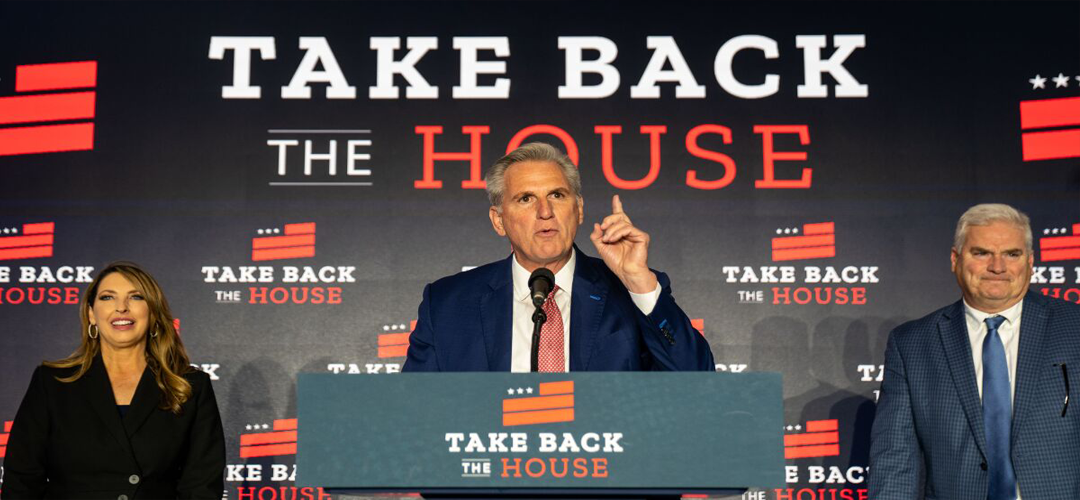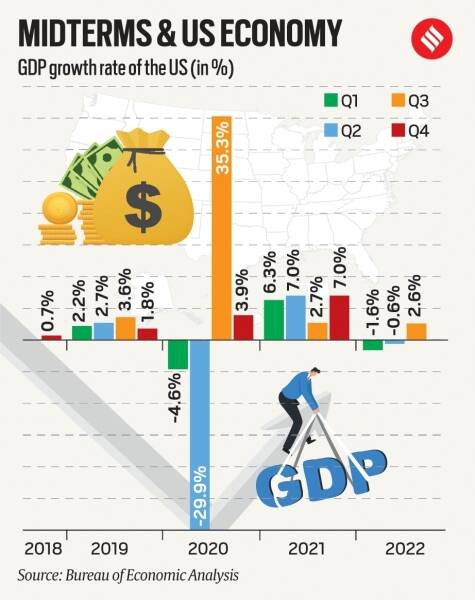THE ELECTION OF ECONOMICS?
November 12, 2022 | Expert Insights

Polls projected that Republicans would effortlessly win the House and almost certainly seize control of the Senate in the much-anticipated "red wave" in the U.S. midterm elections. As the results came in, it appeared that Democrats had a marginally better chance of keeping the Senate, while Republicans were more narrowly projected to win control of the House.
However, the critical question is how can the presidential election be impacted, given that a recession, possibly in 2024, is all but certain due to the Federal Reserve's relentless tightening of rates.
Background
Midterm elections are the general elections held in the United States on Election Day, the Tuesday after the first Monday in November, roughly halfway through a president's four-year term in office. During the midterm elections, candidates run for all 435 seats in the U.S. House of Representatives and 33 or 34 of the 100 seats in the U.S. Senate.
Vermont and New Hampshire also elect their governors to two-year terms in both midterm and presidential elections, while 34 of the 50 U.S. states elect their governors to four-year terms during midterm elections. Thus, during midterm elections, 36 governors are chosen. In midterm election years, many states also elect officers to their state legislatures. At the municipal level, elections are also held. Numerous mayors, other local public officials, and a wide range of citizen initiatives are all on the ballot.
Regular and special elections are frequently held concurrently, allowing for the partial election of more senators, governors, and municipal authorities.
In short, Election Day in the U.S. is a festival of democracy!

Analysis
The economy was by far the main topic of the midterm elections. The biggest concern among voters was the four-decade-high inflation rate. There was widespread dissatisfaction nationwide with prices that remained consistently high and bare store shelves. The cost of food and fuel has been increasing at almost double-digit rates.
The US GDP shrank on a macroeconomic level in the first two quarters of 2022. On the eve of the elections, a poll showed that Biden's support ratings had plummeted to 39 per cent, portending what appeared to be a crushing defeat.
Does the lack of the angry red wave and the Democrats' stronger-than-expected performance suggest the status of the economy matters less than it appears?
Democrats managed to avoid the economic bullet, but why or how is unclear. Undoubtedly, the rise in prices brought on by the conflict in Ukraine has hurt political incumbents of all stripes around the world.
Analysts contend that topics like abortion rights helped Democratic voters gain support in various U.S. states. Others claim that despite resentments, voters cast ballots along party lines because of the highly polarised structure of American democracy.
Even if the results of the midterm elections would be discussed endlessly for weeks to come, with few clear-cut conclusions, the economy is unlikely to disappear from the political radar. This is primarily due to the U.S. Federal Reserve's efforts to contain inflation, which threaten to send the largest economy in the world into a recession.
The central bank increased interest rates for the U.S. economy once more last week, continuing the dramatic tightening it has been pursuing since the start of 2022. Higher interest rates cause the economy to grow slowly by discouraging consumer spending and making new investments more expensive. The rate of increases has been so rapid that it is now all but certain that the U.S. economy will experience a recession, either in 2023 or in 2024, the year of the next presidential election.
A recession occurs when the U.S. economy's overall output declines for two consecutive quarters. However, in the broader sense, it describes a protracted period of economic recession accompanied by job losses, declining earnings, and decreased spending.
How does the Fed cause a recession? To put it plainly, the solution is to bring back economic price stability. Fed Chair Jay Powell recently emphasised the value of maintaining price stability in a remark. "The Federal Reserve is in charge of maintaining price stability, which supports our economy. Without price stability, no one benefits from the economy.” According to Powell, with price stability, they will have a sustained period of favourable labour market conditions for all.
Powell was conscious of the effects of the Fed's choice to be sure: "To reduce inflation, a sustained period of below-trend growth and some easing of labour market conditions are likely. Price stability must be restored to create long-term maximum employment and stable pricing conditions. The historical evidence strongly advises against easing policy too soon. Till the project is completed, we will not budge.”
The Federal Reserve wants to reduce inflation from 8.2 per cent in September to 2 per cent. They have already increased the interest rate to 4 per cent.
The issue is how hiking interest rates will affect the costs of goods like crude oil and other ones that are causing inflation. The Fed has previously acknowledged that it lacks the means to lower prices immediately. Powell has nonetheless explained the Fed's ongoing interest rate increases.
The U.S. has a problem with excessive demand, unlike many other nations that only see a rise in inflation due to supply limitations. As it recovered from the epidemic, the U.S. expanded relatively quickly, exhibiting a true "V-shaped" recovery. Increased interest rates have the effect of reducing excessive demand.
The Fed hopes to maintain longer-term inflation expectations and public conviction in 2 per cent inflation by hiking interest rates. People will start demanding greater pay if they lose hope that inflation will, at least in the short term, return to the 2 per cent objective. As a result, employers (firm owners) will increase their pricing to pay higher wages, and this can spiral out of control.
Assessment
- President Joe Biden can feel satisfied that the results are not as bad as perhaps he had feared. They have bucked the trend whereby the incumbent party usually got its ‘comeuppance’ at the midterm polls! The younger generation seems to be giving the Democrats a lifeline, many first-time voters who voted in droves, notwithstanding the economic mess. Is it a “victory of democracy”, as claimed by Democrats?
- With the Mid Term elections behind them, the Democrats will have to gear up to stabilise the economy sooner rather than later as 2024 draws closer; a task easier said than done!








Comments